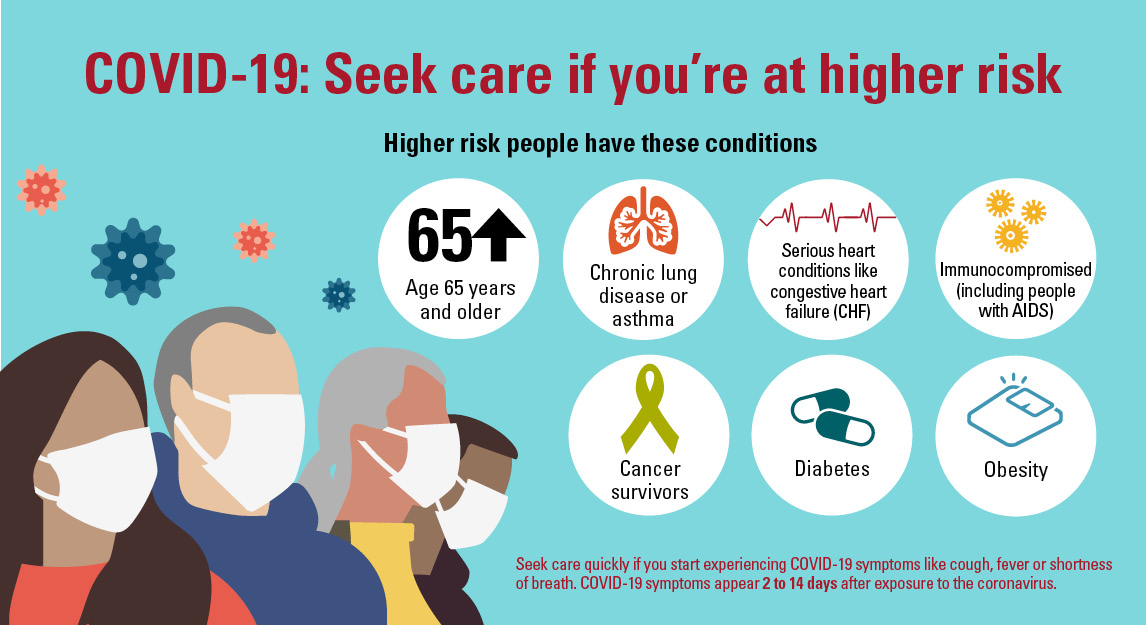The risk of developing dangerous symptoms of COVID-19 may be increased in people who are older and also in people of any age who have other serious health problems — such as heart or lung conditions, weakened immune systems, obesity, or diabetes. This is similar to what is seen with other respiratory illnesses, such as influenza.
While each of these factors can increase the risk of severe COVID-19 symptoms, people who have several of these other health problems are at even higher risk.
Older age
People of any age, even children, can catch COVID-19. But it most commonly affects middle-aged and older adults. The risk of developing dangerous symptoms increases with age, with those who are age 85 and older at the highest risk of serious symptoms. In the U.S., about 80% of deaths from the disease have been in people age 65 and older. Risks are even higher for older people when they have other health conditions.
Take all your medications as prescribed. Consider developing a care plan that includes information about your medical conditions, medications, health care provider’s names and emergency contacts.
Nursing home residents are at high risk because they often have multiple health problems, combined with advanced age. And germs can spread very easily between people who live in close proximity to each other. If you live in a nursing home, follow the guidelines to prevent infection. Ask about protection measures for residents and visitor restrictions. Let staff know if you feel ill.
Older people are also more likely to have Alzheimer’s disease, which can make it more difficult for them to remember the precautions recommended to prevent infection.
Lung problems, including asthma
COVID-19 targets the lungs, so you’re more likely to develop severe symptoms if you already have lung problems, such as:
- Chronic obstructive pulmonary disease (COPD)
- Lung cancer
- Cystic fibrosis
- Pulmonary fibrosis
- Moderate to severe asthma
While some medications for these conditions can weaken your immune system, it’s important to stay on your maintenance medications to keep symptoms as controlled as possible. You may want to talk to your health care provider about obtaining an emergency supply of prescription medications, such as asthma inhalers.
It may also help to avoid the things that make your asthma worse. These asthma triggers can vary from person to person. Examples include pollen, dust mites, tobacco smoke and cold air. Strong emotions and stress can trigger asthma attacks in some people. Others are bothered by strong odors, so make sure the disinfectant you’re using isn’t an asthma trigger for you.
In addition to being an asthma trigger, smoking or vaping can harm your lungs and inhibit your immune system, which increases the risk of serious complications with COVID-19.
Heart disease
Many types of heart disease can make you more likely to develop severe COVID-19 symptoms. These include:
- Cardiomyopathy
- Pulmonary hypertension
- Congenital heart disease
- Heart failure
- Coronary artery disease
Continue to take your medications exactly as prescribed. If you have high blood pressure, your risk may be higher if you don’t control your blood pressure and take your medications as directed.
Diabetes and obesity
Type 1 or Type 2 diabetes can increase your risk of serious COVID-19 symptoms. Being overweight, obese or severely obese also increases this risk.
Diabetes and obesity both reduce the efficiency of a person’s immune system. Diabetes increases the risk of infections in general. This risk can be reduced by keeping blood sugar levels controlled and continuing your diabetes medications and insulin. If you are overweight or obese, aim to lose weight by eating a healthy diet and getting regular physical activity.
Cancer and certain blood disorders
People who currently have cancer are at higher risk of developing more severe illness from COVID-19. This risk can vary, depending on the type of cancer and the kind of treatment you’re receiving.
Sickle cell anemia is another condition that increases the risk of severe COVID-19 symptoms. This inherited disorder causes your red blood cells to become hard, sticky and shaped like the letter “C.” These deformed red blood cells die early, so oxygen can’t be transported around your body as well. It also causes painful blockages in small blood vessels.
Another inherited blood disorder, called thalassemia, might also make you more likely to have serious COVID-19 symptoms. In thalassemia, the body doesn’t produce enough hemoglobin and this affects how well the red blood cells can carry oxygen.
Read more about how a weakened immune system, chronic kidney or liver disease and risks for people with down syndrome.







